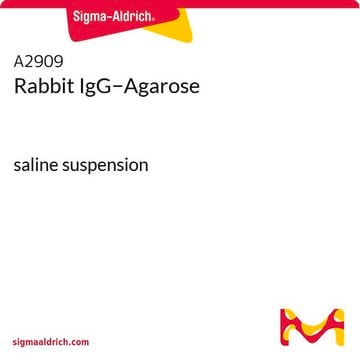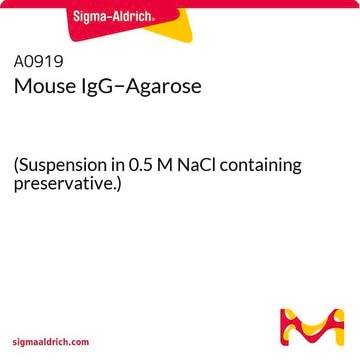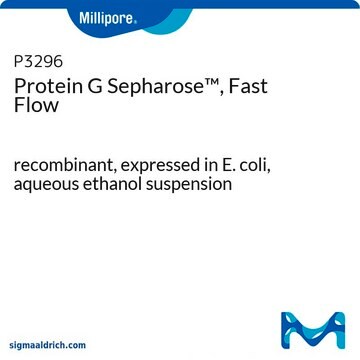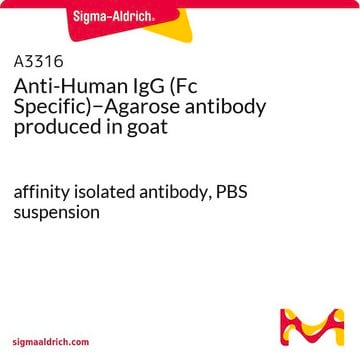A6284
Human IgG−Agarose
suspension
Synonym(s):
IgG Agarose
Sign Into View Organizational & Contract Pricing
All Photos(1)
About This Item
Recommended Products
conjugate
agarose conjugate
Quality Level
form
suspension
extent of labeling
≥5 mg per mL
matrix
Cross-linked 4% beaded agarose
matrix activation
cyanogen bromide
matrix spacer
1 atom
storage temp.
2-8°C
General description
Human IgGs are glycoprotein antibodies that contain two equivalent light chains and a pair of identical heavy chains. IgGs have four distinct isoforms, ranging from IgG1 to IgG4. These antibodies regulate immunological responses to allergy and pathogenic infections. IgGs have also been implicated in complement fixation and autoimmune disorders.
Application
IgG-Agarose is an immuno-adsorbent that can be used to affinity purify antibodies, remove species-specific cross-reacting antibodies or remove contaminating antibodies from an antiserum preparation. Typically, cross-reacting antibodies may be removed from an antiserum preparation using an equal volume of IgG-Agarose (resin volume). However, the resin to antiserum ratio will vary with individual applications.
Tandem affnitiy purification pulldown was performed in yeast cultures using agarose-linked human IgG. Supernatants were mixed with 30μl of agarose beads overnight.
Physical form
Suspension in 0.5 M NaCl containing preservative.
Disclaimer
Unless otherwise stated in our catalog or other company documentation accompanying the product(s), our products are intended for research use only and are not to be used for any other purpose, which includes but is not limited to, unauthorized commercial uses, in vitro diagnostic uses, ex vivo or in vivo therapeutic uses or any type of consumption or application to humans or animals.
Storage Class Code
10 - Combustible liquids
WGK
WGK 3
Flash Point(F)
Not applicable
Flash Point(C)
Not applicable
Certificates of Analysis (COA)
Search for Certificates of Analysis (COA) by entering the products Lot/Batch Number. Lot and Batch Numbers can be found on a product’s label following the words ‘Lot’ or ‘Batch’.
Already Own This Product?
Find documentation for the products that you have recently purchased in the Document Library.
Graciela C Calabrese et al.
Thrombosis research, 113(3-4), 243-250 (2004-05-14)
Dermatan sulfate (DS) is a member of the family of structurally complex, sulfated, linear heteropolysaccharides called glycosaminoglycans (GAGs). It has a similar structure to heparin and heparan sulfate (HS), but with acetylgalactosamine replacing glucosamine, and the uronic acid moiety, mainly
Pierre Fotso et al.
The Journal of biological chemistry, 280(30), 27613-27623 (2005-06-04)
The conserved oligomeric Golgi (COG) complex is an evolutionarily conserved peripheral membrane oligomeric protein complex that is involved in intra-Golgi protein trafficking. The COG complex is composed of eight subunits that are located in two lobes; Lobe A contains COG1-4
A G Norden et al.
Clinical chemistry, 43(6 Pt 1), 957-962 (1997-06-01)
A novel interference with measurements of serum free thyroxine (FT4) caused by rheumatoid factor (RhF) is described. We found misleading, sometimes gross, increases of FT4 results in 5 clinically euthyroid elderly female patients with high RhF concentrations. All 5 patients
Graciela C Calabrese et al.
Thrombosis research, 105(6), 537-541 (2002-07-02)
Antithrombin (AT) high affinity of unfractionated heparin (UFH) resides in a specific pentasaccharide sequence. Heparin also regulates complement activity on the classical and the alternative pathways. Most experimental pieces of evidence accumulated show that these important activities reside in different
Yeon Jeong Kim et al.
Frontiers in plant science, 10, 667-667 (2019-06-14)
Control of protein turnover is a key post-translational control point in the oscillatory network of the circadian clock. Some elements, such as TOC1 and PRR5 are engaged by a well-described F-box protein, ZEITLUPE, dedicated to their proteolytic turnover to shape
Our team of scientists has experience in all areas of research including Life Science, Material Science, Chemical Synthesis, Chromatography, Analytical and many others.
Contact Technical Service








